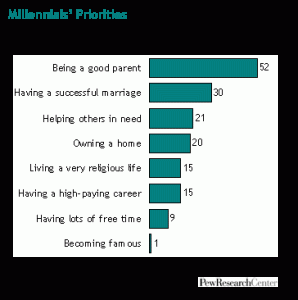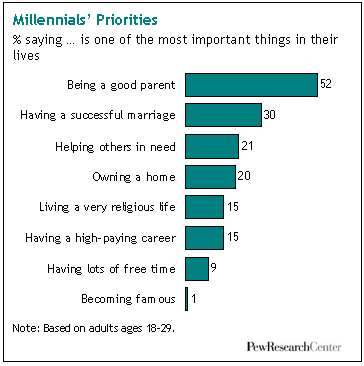By Kelly Cleary
Most college students today are probably well aware that they have often been labeled by educators, market researchers, and prospective employers as Millennials, Generation Y or the Next Me Generation. Older generations comparing themselves to the next crop of young adults is nothing new, but never before has a generation (in this case, those born between the early 1980’s through the early 2000’s) been scrutinized so closely as technology has made it easier to track the behavior of large numbers of people while our consumer culture has provided the motivation for marketers to gather as much information as possible about this group of young people and their purchasing power.
Millennials: Confident. Connected. Open to Change.
As a student affairs professional, I’ve sat through many conference presentations that introduce educators to this generation of students who grew up receiving trophies, regardless of the final score; a generation of students who have been connected and online ever since they can remember, not thinking twice about posting photos and very personal updates about themselves on a myriad of social networking sites; a generation of students who have been pushed to achieve and believe they are special. The Pew Research Center’s 2010 report, The Millennials: Confident. Connected. Open to Change , offers a fascinating and, I think, very positive portrait of this “self-expressive, liberal, upbeat” generation of young people who are “receptive to new ideas and ways of living.”
One of my favorite Millennial monikers is the “Next Civic Generation” referenced by Winograd and Hais, co-authors of Millennial Makeover: MySpace, YouTube, and the Future of American Politics, which proposes that the Millennials are the most civic minded generation since the 1930s and 1940s. According to Michael Brown, co-founder and CEO of City Year, “Community service is part of their DNA. It’s part of this generation to care about something larger than themselves.” (USA Today, 4/2009)
Penn students engaging locally and globally
As a career counselor at Penn, I am often humbled and inspired by the enthusiasm and commitment of so many students and alumni who work with various community service and public interest initiatives in West Philadelphia, across the nation, and around the globe. Many Penn students intern or volunteer for nonprofits and many go on to create nonprofits or to support public interest initiatives as part of their private sector careers. Clearly our students know that pursuing an internship with a nonprofit organization is one of the best ways to learn about public interest careers, build their skill set, and figure out what specific career path they eventually want to pursue.
Fortunately for Penn students who identify with the “Civic Generation” label, there are many ways for them to connect with related volunteer and internship opportunities and to talk with alumni who work in the field. Our Career Resources by Field page includes resources and tips from alumni for students interested in nonprofits, policy, international development, and government careers. And Idealist’s Guide to Nonprofit Careers for First-time Job Seekers is also a wonderful primer.
If you are interested in learn about what a nonprofit internship might involve, read the Civic House Associate Coalition’s summer internship blog. The contributors are Penn students who have received funding through Civic House programs for internships affiliated with the Penn community and beyond. I’m sure you’ll find Ankit, Estee, Allyson, Haley, and Shri’s observations, reflections, and musings interesting, insightful, and even entertaining. I loved reading about Ankit’s students Pradoop and the two Poojas.










